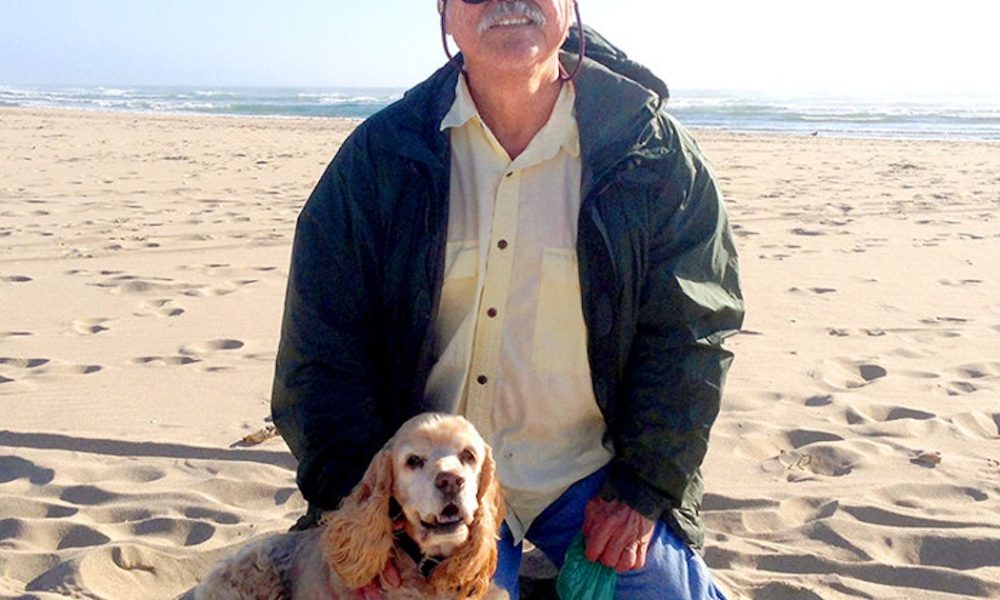 Tom Harada Photo provided
Tom Harada Photo provided
When Ulla Hacker-Harada’s friend lost someone to cancer, she thought that she was being a sympathetic and supportive pal, one who was there for whatever her friend needed.
But when her own husband, Tom Harada, died of terminal cancer from an unknown origin in 2017, she realized she ”didn’t have a clue what (her friend) was going through.”
”That’s the way it is with everybody,” she said. ”Everyone grieves differently. It’s so unique what people have to go through, for everyone involved.”
After Tom passed, Hacker-Harada came up with an idea to honor his memory with Round-Up Saloon owner, Kelly Coughlin. They decided to create the Tom Harada Memorial Music Jam, because Tom was a musician his whole life.
”The annual Tom Harada Memorial (Music) Jam is a tribute to a man that touched hearts through his music and inspiring outlook on life to all of those that knew and loved him,” Coughlin said.
This year, the second annual Tom Harada Music Jam will take place on Saturday, Aug. 24 at the Round-Up Saloon, with one change – it won’t focus only on Tom.
”I want it to be for the people that have lost loved ones and survived cancer,” Hacker-Harada explained. ”We have had notable things happen; Tamara Lynn Blum lost her life to cancer, and you just hear about it. I wanted it to be an event where people can get together and have a good time and celebrate that on a particular level, at this point in time, we’re defeating it.”
Hacker-Harada described cancer as ”almost like an epidemic” that turns the world upside down for the people it affects. She said that it’s being on a path that there’s no control over.
”It’s something that takes control away from you,” she explained. ”Your life is dictated by oncologists and appointments and blood tests. You build the rest of your life around that.”
She added that when Tom was diagnosed in July 2016, even though the cancer had spread to his blood and was considered terminal, she said that she believed from the beginning that he was going to beat it. Now, she said she finds herself in a more negative headspace about beating cancer in the later stages.
”I think there’s a point when you have to stop,” she said.
Hacker-Harada met Tom when he and his daughter were visiting Hawaii. She had always been aware of Tom because her brother played music with him, and it was her brother that shared Hacker-Harada’s contact information when he came to Hawaii. He told her that whenever she came back to the mainland to give him a call.
”I did and there we are,” she said.
Their first date was seeing the movie, ”First Wives Club,” where the plot focused on divorced women. She said that Tom was never into the ”machismo attitude.”
Tom was born in Japan and began performing onstage at the age of 4. When he came to the U.S. during his high school years, he put a band together and made playing music his living. He played piano, guitar, banjo and ukulele; he taught himself how to play most of the instruments.
Hacker-Harada described him as a self-taught individual; beyond music, he taught himself to fish and to frame photography. He ran a frame shop out of his home and loved to fish. She said that all five of his children that he raised with his first wife have picked up on his hobbies; they are all musicians, artists, cooks and fans of fishing.
Coughlin, who was Tom’s friend and fishing partner, described Tom as a ”true Renaissance man.”
”Musician, fisherman, boatman, cook, small businessman, thoughtful and loving husband and father to five children,” Coughlin listed. ”He was incredibly generous and always giving of his time and resources to others.”
Another friend of his, Don Carpeneti, said he met Tom in 1972 when he was playing music at the Black Forest Tavern; he had a bass drum hat, a cymbal on each foot, a harmonica around his neck and was playing guitar.
”I really enjoyed his material and his voice so I introduced myself and asked him questions, and that was the beginning of a long friendship,” he said.
Tom taught Carpeneti to play bass and two weeks later they were playing at the tavern together. They were in a band together for three years and would still play music whenever they got together.
”I never was a great musician,” he said. ”I probably didn’t know what I didn’t know, and he put up with me. But I always learned something every time I played music with him.”
They also started to fish together.
”Always, anytime you needed him for anything, he was always there,” Carpeneti said. ”He built all my fly rods.”
Over the years, after Tom and he each got married, they would go on camping trips together. Carpeneti described Tom as a ”very generous soul” who was very smart. Carpeneti will be playing during the second annual music jam.
Along with being smart, Hacker-Harada said that he was very direct and not a schmoozer.
”Don’t ask him you look in those pants unless you want to hear the answer,” she said. ”It took awhile to get used to.”
That said, Hacker-Harada added that he was the most non-judgmental person. She thinks that attitude comes from the fact that he struggled with poverty throughout his life while making a living as a musician. The lessons he taught her about judgment have continued to stick with her.
”The biggest thing I learned from him is not to be judgmental,” she said. ”Be patient. Walk a mile in someone else’s shoes.”
He also wanted Hacker-Harada to be self-reliant. She said one of the things he told her that shocked her when they got together was: ”Don’t expect me to be the person who makes you happy; you have to make yourself happy.”
After his passing, Hacker-Harada said that her friends were there for her, checking up on her and making sure she got out of bed. Between them and the people at the Round-Up, customers and staff, they were there if she needed anything.
”They meant it, and they did. They helped me through buying a new water heater – what do I know about stuff like that. Inviting me to dinner, they reached out and took care of me, and I guess that was a little bit of a surprise,” she said. ”It takes a village, and they’re the village.”
She said she hopes the music jam will be able to offer some positivity to people’s lives.
”The commonality of cancer – surviving it, not surviving it, being in the thick of it – brings people together,” she explained. ”They can share and realize they are not alone in their feelings and can just have a good time. One of the things that’s so hard when going through this is to laugh.”







